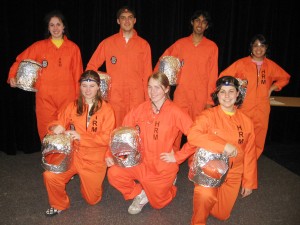MindShift

Originally appears in the Winter 2012-2013 issue
A solitary senior student stands at the front of a high school class in a darkened room with a large screen behind her. She states firmly and quietly, “This is Mindshift. Please stay calm and in your seats. What you are about to see is real… or is it?”… She departs as the room goes black. Galaxies in space flash on-screen accompanied by eerie, synthetic music. Seven students burst into the classroom as astronauts in full space suits and use metallic foil to set up their consoles over empty chairs or desks. From the front, the captain asks for reports on the ship’s energy, water, terrain, atmosphere and health systems. “All clear” comes back the report from each Lieutenant assigned to a particular system. They are dispersed throughout the class. The Captain orders Lieutenant Decade, who is at the helm computer, to “engage,” and the ship begins to travel through time with images on-screen, starting in the year 1890 with the destination of 2030. The class counts off the decades as they progress, with stops every 20 years for detailed live reports on the status of the ship’s systems from the Lieutenants, followed by responding comments and orders from the Captain.”…
This is the opening to the initial performance phase of MindShift, a sustainability peer education program written by and for high school youth, which is currently operating in both high school and community contexts across Canada from Nova Scotia to Alberta. In schools, teams perform for classes in their school. The team’s hour-long, dramatic, multimedia performance and interactive discussion leads into a second phase in which the team becomes a nucleus of an extra-curricular club (or is part of a current enviro club). This group organizes and facilitates school and/or community sustainability education events through the rest of the year. Typically, two afternoons and a number of afterschool rehearsals prepare the team to perform. This process provides the team bonding that enables the group to work together through the year on sustainability projects of their choosing. In the community context, a youth action team from the Halifax Regional Adventure Earth Centre (a municipal recreation centre), which originally developed the program, provides presentations to youth and adult groups, be they community youth events or adult gatherings and conferences. This team’s action projects are ongoing and interspersed with the performances.
The first of four aims of this article is to describe the why, what and how of MindShift, and its underlying peer education approach. All of the program resource materials are freely available on line for use and adaptation by any school or community youth group.1 Second, it briefly summarizes in-depth research on the learning and growth of youth who have lead the program. Third, it addresses the challenges of implementing a peer education program of this nature and the lessons learned. Finally, it considers the untapped potential of peer education as a tool in working with youth in education for sustainability.
This content is restricted to subscribers only.
If you are not yet a subscriber, please consider taking out a subscription here.
If you are an existing subscriber, kindly log in or contact us at info@greenteacher.com for more information.





